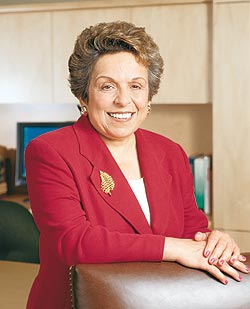
University of Miami President and former Clinton Cabinet member Donna Shalala served as a Peace Corps Volunteer in Iran in the 1960's.
Donna Shalala, the longest-serving US health secretary in American history, believes her country can learn something from England's National Health Service
Lessons for America
Donna Shalala, the longest-serving US health secretary in American history, believes her country can learn something from the NHS, writes Hélène Mulholland
Friday June 17, 2005
Donna Shalala
Donna Shalala, health secretary under the Clinton administration. Photo: AP
Donna Shalala spent too long in US politics to blurt out comments without giving them some serious consideration first. So when the longest-serving US health secretary in American history tells you that healthcare provision across the developed world is a mass of "deeply dysfunctional" systems, you tend to take notice.
For Ms Shalala, now a non-executive director of the US healthcare giant, United Health group, the diagnosis does not signal hopelessness, but an opportunity for redesigning - sometimes radically - the way healthcare systems operate.
Ms Shalala, who visited Birmingham this week to address the NHS Confederation annual conference, knows how tough the challenges can be. She served for eight years as health and human services secretary to the Clinton administration, when efforts to reform healthcare for US citizens proved limited in their success.
As a representative of the company that exported the Evercare approach to Britain for the case management of long term conditions, Ms Shalala is the first to admit that the trading of ideas flows both ways. "There is not a major healthcare expert in the US that does not study the British system," she says. "We have enormous respect for what is going on over here."
Co-operation between the two nations has been whirring in the background for quite some time, she adds, citing the work begun when Alan Milburn was still health secretary over common concerns such as medical errors and infection control.
Shared values around patient-centred care and choice also prompt policy makers to hop across the pond for inspiration. But asked which healthcare system is the superior of the two, Ms Shalala demurs. The fragmented profile of the US healthcare, compared to comprehensive provision under the NHS monolith, makes such a question impossible to answer.
"You can't compare the US system to the British system and say one is better," she says. "We have 44 million people without healthcare provision in the US," says Ms Shalala, who describes the failure of the Clinton administration to institute universal provision for American citizens as the deepest regret of her political years.
But paradoxically, Ms Shalala believes it is this very patchwork of provision across the Atlantic that paves the way for innovation from which other countries can learn, and with which United Health is now doing business in Britain.
Ms Shalala believes lessons learned back home can make a "meaningful contribution" to NHS services, particularly around the role of commissioning services for patients. Already the company is working with 50 primary care trusts and strategic health authorities, and the company wouldn't say no to a bigger foothold in the NHS market.
"We run the risk that services [are] shaped not by the need of patient preference but by providers themselves." Sounds like a familiar phrase, enshrined in the whole patient choice agenda which is now dominating the policy landscape. But clearly more needs to be done, as Nigel Crisp, chief executive of the NHS signalled yesterday in his announcement to streamline the number of primary care trusts (PCTs) and revise their roles to ensure the contracting of services becomes more effective.
Ms Shalala explains why she believes that the US is ahead of the game. "The reason we have developed the expertise is because we have a fragmented system. The only way we can get progress in our system is through a very sophisticated commissioning programme, and that is using data to drive the decisions." It isn't the size of the primary care trusts that necessarily impedes effective commissioning in the UK, but the dearth of data on which to form decisions. Information, not rearranging the deck chairs, is the best way to improve commissioning, she advises. "Do not get hung up on organisational mergers as a way of achieving clinical integration. You are not getting to achieve it by merging, or merging hospitals and PCTs. We have tried that in the US and it has not done the trick."
Ms Shalala is less confident about the best way to measure quality in NHS services. Trying to prove you made a difference requires an "awful lot of information to really be able to tell".
"Most people think of improving quality in the NHS and everybody is talking about waiting times," she says. "That is one measure but there are lots of other measures and it takes a lot of data. I believe the future of healthcare is to collect data and using it to inform your decisions."
One of the tips for ensuring quality is to make sure you have the right kind of patients for the treatment in mind. Making no mention of the fact that the evidence has yet to prove that the use of the Evercare programme in UK has led to the anticipated reduction in bed days, Ms Shalala says the crux of making such a programme work is knowing your patient.
"You know that it works for certain kinds of patients so you have to be able to select the patients for whom the management regime will make a difference.
"You can't just throw anyone into the system and expect it to improve healthcare... It requires a pretty sophisticated system and careful selection for patients for whom it will make a difference and that is the key of producing good outcomes for both the healthcare system and the individual."
Penetrating the European market to sell good commissioning or to keep patients out of hospital is not the only reason she is here, Ms Shalala admits. It is also to learn tips from the NHS about improving healthcare which United Health can then take back to the US to sell.
"We would not be making an investment here if we did not think there were things to learn," she says. Her words will be music to the government's ears.












